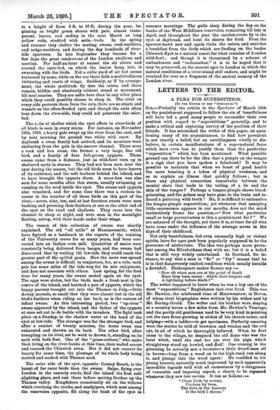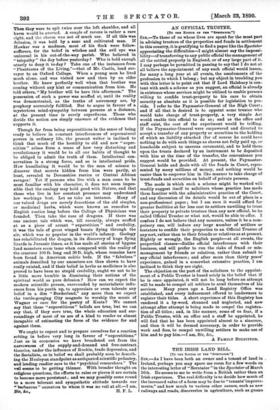LETTERS TO THE EDITOR.
A PLEA FOR SUPERSTITION.
[To THZ EDITOR OF VIZ 0 8PZOTZTOR.°] SIE,—Probably the article in the Spectator of March 16th on the punishment supposed to follow the sin of boastfulness will have led a good many people to reconsider their own
position with regard to "superstitions" generally, and to make a critical and exploring survey of the position of their friends. It has astonished the writer of this paper, on ques- tioning many of his acquaintances, to find how prevalent is, not exactly a belief, but an unwillingness wholly to dis- believe, in certain manifestations of a supernatural force which have even less to justify them than the particular " superstition " which has been mentioned. What possible ground can there be for the idea that a pimple on the tongue is a sign that you have spoken a falsehood ? It may be possible to maintain that when we boast of good health the mere boasting is a token of physical weakness, and so to explain an illness that quickly follows ; but is there any physical connection conceivable between the mental state that leads to the telling of a lie and the skin of the tongue ? Perhaps a tongue-pimple shows blood- poisoning, and the poison may have gone to the brain and in- duced a paltering with truth ! No, it is difficult to rationalise the tongue-pimple superstition; yet whenever that annoying little excrescence appears in our mouths, does not the mind instinctively frame the question,—" Now what particular small or large prevarication is this a punishment for ?" We are ashamed of the thought, yet there it is, at least for all who have come under the influence of the average nurse in the days of their childhood.
Not only boastfulness, but even unusually high or violent spirits, have for ages past been popularly supposed to be the precursor of misfortune. The idea was perhaps more preva- lent among the Elizabethans than with us; but it is a belief that is still very widely entertained. In Scotland, for in- stance, to say that a man is " fie " or " fey " means that he is in that dangerously exalted condition which visually heralds a downfall. Shakespeare makes Romeo say :—
"How oft when men are at the point of death
Have they been merry : which their keepers call A lightning before death ?"
The writer happened to know when he was a boy one of the most " superstitious " Englishmen that ever lived. This was Mr. Hawker, the celebrated vicar of Moorwenstow, in Devon, of whom rival biographies were written by his widow and by Mr. Baring-Gould. The writer and his brother were staying at a country house a few miles from Mr. Hawker's Vicarage, and the portly old gentleman used to be very kind in pointing out the rare ferns growing in niches of his church-tower, and
helping—with a ladder—to get specimens. Perfectly amazing were the stories he told of brownies and witches and the evil eye, in all of which he thoroughly believed. When he first
came to the village, he despised the old dame who was the local witch, until she east her eye over his pigs, which
straightway stood up, howled, and died! One evening in the gloaming he actually saw a brownie—a little dwarf-man all in brown—leap from a wood on to the high-road, run along it, and plunge into the wood again! He confided to his young hearers, naturally much impressed by such apparently incredible legends told with all earnestness by a clergyman
of venerable and imposing aspect, a charm to be repeated whenever they saw two ravens. It ran as follows "Clean birds by sevens, Unclean by twos, The dove in the heavens Is the bird I choose." Then they were to spit twice over the left shoulder, and all harm would be averted. A couple of ravens is rather a rare sight, and the charm was not of much use. If all this was delusion, it was held by a sane and cultivated man. If Hawker was a madman, most of his flock were fellow. sufferers, for the belief in witches and the evil eye was universal in his out-of-the-way parish. Who believed in "telepathy" the day before yesterday ? Who is bold enough utterly to deny it to-day Take one of the instances from "Phantasms of the Living,"—that of Mr. Castle, land sur- veyor to an Oxford College. When a young man he lived much alone, and was visited now and then by an elder brother. He knew perfectly well when that brother was coming without any hint or communication from him. He told others, "My brother will be here this afternoon." The possession of such a power was scoffed at, until its reality was demonstrated, as the truths of astromony are, by prophecy accurately fulfilled. Bat to argue in favour of a mysterious mind-sympathy between persons at a distance, at the present time is surely superfluous. Those who deride the notion are simply unaware of the evidence that supports it.
Though far from being superstitious in the sense of being ready to believe in constant interferences of supernatural powers in ordinary life, the present writer is inclined to think that much of the hostility to old and new " super- stition " arises from a sense of how very disturbing and revolutionary it would be to all our habits of thought to be obliged to admit the truth of them. Intellectual con- servatism is a strong force, and so is intellectual pride. How humiliating it would be to the man of science to discover that secrets hidden from him were partly, at least, revealed to Devonshire rustics or Central African savages ! Yet if persons who live with a man come to be most familiar with his character, it does not seem impos- sible that the analogy may hold good with Nature, and that those who live in her constant presence may understand her workings best. Let us take an instance. Many of our valued drugs are merely decoctions of the old simples, or medicinal herbs, which were known as remedies to English rustics long before the College of Physicians was founded. Then take the case of dragons. If there was one ancient tale which was, till recently, always scoffed at as a piece of arrant " superstition " and credulity, it was the tale of great winged beasts flying through the air, which was so popular in the world's infancy. Geology has rehabilitated the dragon, in its discovery of huge flying lizards in Jurassic times, as it has made all stories of bygone land monsters seem tame when compared with the reality of the creature 100 ft. long and 30 ft. high, whose remains have been found in American oolitic beds. If the " fabulous " animals described by our ancestors are thus shown to have really existed, and if their belief in herbs as medicines is also proved to have been no stupid credulity, ought we not to be a little more humble in dismissing their notions of the spiritual world as pure delusion ? How can we expect the modern scientific person, surrounded by materialistic influ- ences from his youth up, to appreciate or even tolerate any belief in a dim "Borderland," any more than we expect the turtle-gorging City magnate to worship the music of Wagner or care for the poetry of Keats ? We cannot say that these " superstitious " beliefs are true, but we can say that, if they were true, the whole education and sur- roundings of most of us are of a kind to render us almost incapable of estimating the force of the evidence for and against them.
We ought to expect and to prepare ourselves for a reaction setting in before very long in favour of "superstitions." Just as in economics we have broadened out from the narrowness of the supply.and-demand and free-contract theories, under the influence of Ruskin, trade depression, and the Socialists, so in belief we shall probably soon be describ- ing the Huxleyan standpoint as antiquated scientific pedantry, and lending readier ears to the "psychical researchers." The veil seems to be getting thinner. With broader thought on religions questions, the efforts to raise or pierce it are certain to become more persistent ; and we may possibly come round to a more tolerant and sympathetic attitude towards our a
barbarous" ancestors to whom it was no veil at all.—I am,







































 Previous page
Previous page